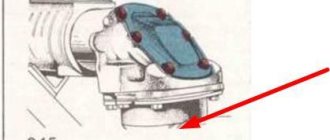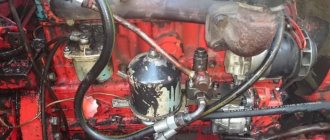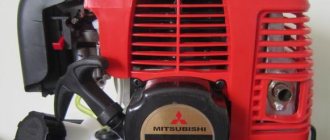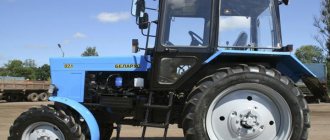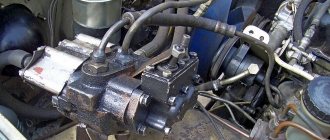The question often arises among tractor drivers: “what oil to pour into the components and mechanisms of the MTZ tractor.” If you read the operating instructions, the old documents talk about using ordinary motor oil of the M-10, M-8 brands in the engine, which, however, is also used in parallel in hydraulics. Today, the manufacturer recommends modernly developed materials with improved characteristics that make it possible to extend the life of tractor units. This material deals with the brands of lubricants used for components and systems of the MTZ 82 tractor.
Oil for transmission units: boxes, drive axles
To lubricate the gearboxes included in the tractor transmission , a list of transmission oils is provided for the main and backup parts, which are available in domestic brands. Lubricants meet the requirements and operating conditions of gearboxes and drive axles in trucks. Thus, mineral all-season lubricant of the Tap-15V brand contains a number of additives that provide extreme pressure properties, retains lubricating properties at low temperatures down to -25°C, ensures reliable operation of the lubricated unit with contact stresses of up to 2000 mPa and oil temperatures in the volume of up to 130° C, is not toxic.
| Transmission housing ( gearbox , rear axle , intermediate part ) | Basics | TAp-15V |
| Duplicate | TAD-17, TSp-15K, TSp-10, Tep-15M | |
| Reserve | Motor M-10G2 | |
| Imported | HESSOL BECHEM HYPOID SAE 80W-90 API GL5/GL4 | |
| Front drive axle (all fill volumes: axle housing and wheel reducers | Basics | TAp-15V |
| Duplicate | TAD-17, TSp-15K, Tep-15M | |
| Imported | HESSOL BECHEM HYPOID SAE 80W-90 API GL5/GL4 | |
| Front axle drive intermediate support housing | Basics | TAp-15V |
| Duplicate | TAD-17, TSp-15K, Tep-15M | |
| Imported | HESSOL BECHEM HYPOID SAE 80W-90 API GL5/GL4 |
Scheduled replacement of lubricant in the housings of transmission units of the MTZ 82(80) tractor is carried out every 1000 operating hours. Traditionally, this event is carried out simultaneously with seasonal tractor maintenance. The filling volume of the combined gearbox housing, rear axle and intermediate part of the tractor is 40 liters.
Technical characteristics of the MTZ 82 tractor
| Structural weight, kg | 3750 |
| Weight as shipped from the factory, kg | 3850 |
| Operating weight, kg | 4000 |
| Maximum permissible weight (total), kg | 6500 |
| Base, mm | 2450 |
| Overall dimensions: length, mm | 3930 |
| Overall dimensions: width, mm | 1970 |
| Overall dimensions: height, mm | 2800 |
| Front wheel track (min), mm | 1430 |
| Front wheel track (max), mm | 1990 |
| Rear wheel track (min), mm | 1400 |
| Rear wheel track (max), mm | 2100 |
| Smallest turning radius, m | 4,5 |
| Agrotechnical clearance of the tractor under the sleeves of the front and rear axle shafts, not less than, mm | 645 |
| Front tire sizes | 11,2-20 |
| Rear tire sizes | 15.5 R38 |
| Specific ground pressure, kPa | 140 |
| Fuel tank capacity, l | 130 |
| Travel speed: transport, km/h max | 34,3 |
| Travel speed: operating, km/h max | 15,6 |
| Load capacity, kg | 3200 |
| Brand | MMZ |
| Model | D-243 |
| Type | 4-stroke, diesel, naturally aspirated |
| Number of cylinders | 4 |
| Cylinder diameter, mm | 110 |
| Piston stroke, mm | 125 |
| Working volume, l | 4,75 |
| Rated rotation speed, rpm | 2200 |
| Rated power, kW (hp) | 59,6 (81) |
| Torque at rated power, N.m | 258.700012 |
| Maximum torque, N.m | 298 |
| Torque reserve factor, % | 15 |
| Specific fuel consumption at operating power, g/kWh | 229 |
| Specific fuel consumption at rated power, g/kWh | 226 |
| Generator nominal power, kW | 1,15 |
| Rated voltage of electrical consumers of the on-board electrical network, V | 12 |
| Rated voltage of the electric starting system, V | 12 (24 – on order) |
| Clutch | Friction, single-disc |
| Transmission | Mechanical |
| Number of forward gears | 18 |
| Number of reverse gears | 4 |
| Bridge type | Split, sliding beam |
| Wheel gear type | Conical |
| Differential type | Self-locking limited friction |
| FDA drive | Two cardan shafts with intermediate support |
| FDA control | Mechanical |
| Bridge type | Composite |
| Wheel gear type | Cylindrical |
| Differential type | Conical with four satellites |
| ZM drive | Constant |
| Workers | – |
| Rear wheel workers | Disc, dry |
| Parking | – |
| Rear wheel parking | Disc, dry |
| Pneumatic drive for trailer brake control | + |
| Type | Unified |
| Additional seat | to order |
| Heater | + |
| Rear PTO | + |
| – rear PTO independent I (at rated engine frequency), rpm | 540 |
| – independent rear PTO II (at rated engine frequency), rpm | 1000 |
| – rear PTO synchronous I, rpm travel | 3,4 |
| Type | Hydrovolumetric |
| Swing mechanism type | Hydraulic cylinder and steering linkage |
| GNS rear | + |
| – type of rear GNS | Separate-aggregate |
| – load capacity on the hinge axis of the lower links of the rear hydraulic pump, kgf | 3200 |
| – number of hydraulic outlets of the rear hydraulic pump | 3 |
| Pump type | Gear |
| Pump displacement, cm3/rev | 32 |
| Maximum pressure, MPa | 20 |
| Pump capacity, l/min | 45 |
| Hydraulic system capacity, l | 25 |
| Type | Wheeled |
| Wheel formula | 4x4 |
Oil for hydraulics and power steering or power steering
For oils used in hydraulics , it is important to maintain a viscosity acceptable for normal operation of hydraulic units under conditions of minimum and maximum temperatures. Thus, completely frozen oil, when the temperature drops, may not be pumped by the pump and block the operation of the hydraulics, and create unacceptable loads in certain parts of the system. The loss of viscosity by the oil when heated will reduce the efficiency of the system's hydraulic power units as a result of a rapid drop in pressure.
| GNS tank (volume 20 liters with power steering or 25 liters with power steering) with hydraulic units | Basics | Summer - M-10G2, M-10G2K, Winter - M-8G2K |
| Duplicate | All-season hydraulic: BECHEM Stariol No. 32, No. 68; ADDINOL Hydraulikol HLP 32, HLP 68; TNK Gidravlik HLP 32, HLP 68; HYDROL HLP 32, HLP 68; WHITTOL HLP 32; Lukoil Geyser 32ST, 68ST; Hydraulic HLP 32, HLP 68. | |
| Reserve | In summer Industrial oil IGP-30, In winter IGP-18 | |
| Separate filling of the power steering housing (6 liters) | Basics | Summer - M-10G2, M-10G2K, Winter - M-8G2K |
| Duplicate | In summer Industrial oil IGP-30, In winter IGP-18 | |
| Reserve | All-season hydraulic: BECHEM Stariol No. 32, No. 68; ADDINOL Hydraulikol HLP 32, HLP 68; TNK Gidravlik HLP 32, HLP 68; HYDROL HLP 32, HLP 68; WHITTOL HLP 32; Lukoil Geyser 32ST, 68ST; Hydraulic HLP 32, HLP 68. |
The hydraulic fluid is replaced during seasonal maintenance of the tractor.
How to change the oil on a MTZ-80 gearbox
The standard procedure for changing transmission fluid is no different from a similar operation on a passenger car. The algorithm of actions will be as follows:
- warm up the equipment to operating temperature, including the transmission;
- Place the tractor on a flat surface and support the wheels with heels;
- Next, you will need to unscrew the top covers to drain the waste more easily;
- then a previously prepared container is placed under the mechanism housing;
- unscrew two drain plugs;
- the oil is drained, it will take a lot of time until 40 liters of liquid comes out by gravity;
- Then the plugs are screwed in, and a new portion of lubricant is poured into the module.
To quickly spread the liquid, the tractor is run in for several minutes after servicing.
Brands and filling volume
The capacity of the units is not predetermining for refueling. A certain amount of oil or lubricant must be poured into the system. Before adding fluid or lubricating components, it is necessary to clarify which brand should be used.
When operating the tractor in the cold season at temperatures up to +5 C, it is necessary to use M-8DM engine oil, which complies with GOST 8581-78. You need to fill 12 liters. The same amount of lubricant, but the M-10DM oil grade according to GOST 8581-78 must be renewed at an ambient temperature of +5 C or more. The lubricant must be changed every 500 hours. You can also use alternative options: M-10G2K and M-10G2. The first sample is changed every 250 mph, and the second 500 mph.
One of the above oils can be filled into the fuel pump. The reason for replacing the fluid in the unit may be its repair. In other cases, it is not required to fill it. The fuel pump holds 0.25 liters of engine oil.
The air cleaner is another tractor component that requires engine oil. But there is a peculiarity here. You can add processing by letting it settle. Replacement is made every 500 hours. But be sure to know how many liters of oil to add. In this case - 1.5 liters.
The power transmission filling capacity is 40 liters. The system is fully charged. At each scheduled service, it is necessary to replace 40 liters of transmission oil TAp-15V, TSp-10 or TSp-15K. Can be duplicated by others - TAD-17.
The wheel gearbox holds 3.7 liters of the same oil as the transmission. Unlike other elements, the gearbox must be filled at two points at once. The wheel reducer, upper bevel pair, drive support and drive pulley are filled with Tap-15V and other similar oils.
All hydraulic units and HPS are filled with modernized M-10G2 engine oil. You can use others: M-8G2K or M-10G2K. The same applies to the power steering; the same oil is used there.
The lining bearing is lubricated with Litol-24. As an alternative, LCP-GM multi-purpose grease can be used. This must be done both during operation and maintenance. To fill 0.2 liters of working volume, you must use a special syringe. A few injections will be enough.
Litol-24 can be called a universal lubricant. It is used in the hub bearing in an amount of 0.4 l, steering knuckle, brace gear, bushings, hinges, bearings in various quantities.
When adding used diesel oil to the pump, it must be taken into account that in winter, when the temperature drops below -20 degrees, it can freeze, so it is important to use AU spindle lubricant. At a temperature of -55, dilution with diesel fuel by 15% is relevant.
Gearbox MTZ-1221. Features, diagram and repair
Steering column The MTZ tractor has also earned good reviews for its relative ease of control. How to change the oil in a Nissan X-Trail variator? A farmer who decides to purchase a tractor should definitely pay attention to MTZ.
What kind of engine oil to fill in the opel zafira engine. Main areas of use In addition to agriculture, MTZ tractors of this modification can be successfully used to carry out work on developing and clearing cities of garbage and transporting various types of cargo. Until the time when machines appeared that were characterized by highly loaded transmissions, nigrol TEP was used to lubricate the above-mentioned units. Mechanism for switching the higher and lower stages of the gearbox reducer Fig.
Mechanism for switching ranges of the MTZ Belarus gearbox 1 - fork; 2 — cover; 3 - sphere; 4 - spring; 5, 7 - fingers; 6, 10 — levers; 8, 12 — covers; 9 - shaft; 11—scene; 13, 17 — keys; 14 — ball retainer; 15 - nut; 16 - bolt; 18 - body.
If necessary, an improved transmission model, designed for 24 forward and 12 reverse gears, can be installed on the MTZ tractor.
Switching from the highest level to the lowest is carried out by pressing the button Refrigerator, for vegetables, for tons and a workshop for processing vegetables and packaging. Replacing the filter in the MTZ hydraulic tank and a lot of interesting things!
Choosing oil for the tractor
MTZ tractors are known for their unpretentiousness, and many owners have a question: is it so important to keep track of what oil to fill? In Soviet times, there was no variety of lubricants and other technical fluids at all, and they were not always available; they poured in what they could get. Maybe this is still possible now? Let's figure out what types of lubricants there are and how they differ. And also how much oil to pour into the MTZ 82 engine and how to check its level.
Firstly, lubricants are divided into motor, transmission and various solid lubricants (solidol, lithol). Secondly, motor oils are synthetic, mineral and mixed. In addition, materials differ in seasonality: summer and winter. They have different viscosity, temperature stability, etc.
In modern engines, lubrication is the hydraulic fluid for all components. It protects parts and friction surfaces from dry friction, forming a stable oil film on them. In addition, this film provides protection against rust, and also minimizes the exposure of parts to various chemically active components that are inevitably formed during engine operation.
